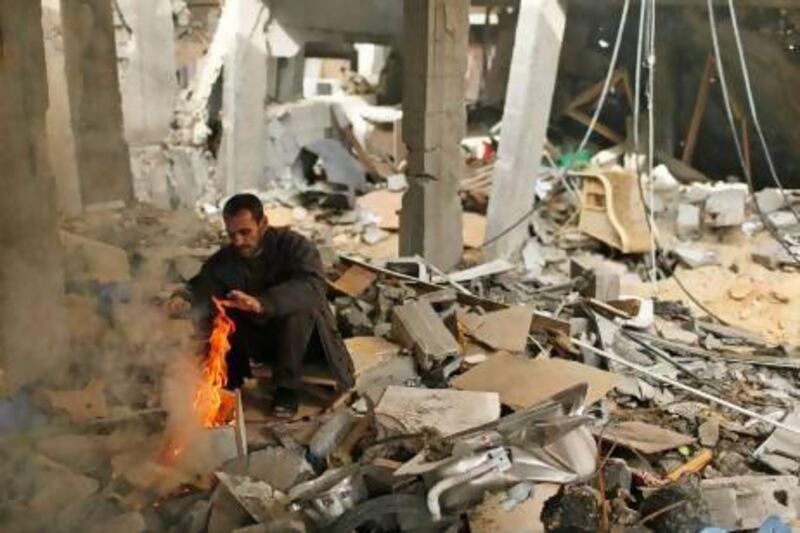United Nations // As the conflict raged in Gaza last week, the Palestinians' bid to become a non-member observer state at the United Nations suddenly became sidelined.
It was not clear as the rockets flew from Gaza, and Israeli F-16s and battleships rained bombs on the territory, what effect the eight-day war would have on support for the Palestinian Authority's UN vote, set for Thursday.
But diplomats now say there has been a groundswell of support for the Palestinian Authority, led by Fatah, and its UN upgrade. The war might have given a political boost to Gaza's militant rulers, Hamas, but the PA - the western-backed proponent of non-violence that has accepted the existence of Israel - makes it the West's preferred Palestinian party to reach a final peace deal.
"This war has bolstered the prestige of Hamas because of its resilience against Israel and the whole idea now is saving [the PA president Mahmoud] Abbas," said a European diplomat on Friday.
"Fatah is in a politically difficult situation and the idea is to try to restore or at least heal their political wounds and perhaps provide them with some political prestige by attaining a new status at the UN."
As 132 nations have already recognised Palestine as a sovereign state, a simple majority vote of 97 countries is certain in the 193-nation General Assembly. The United States does not have a veto to block approval in the assembly as it does in the Security Council, where last year its veto threat helped kill the PA's move for full UN membership.
While the Palestinians had been counting on at least 115 votes before the war, the prospect of a more legitimate 130 votes is now within reach, diplomats said.
Mr Abbas said yesterday he was "fully confident" of his bid's success. "We are going to the UN fully confident in our steps. We will have our rights because you are with us," he told a crowd of about 1,000 people in Ramallah. But Israel and the US have put pressure on Mr Abbas to put off the vote, arguing it is a "unilateral" move and that statehood can come only through direct Israeli-Palestinian talks.
Such a position ignores the will of the countries that have already recognised Palestinian statehood, Arab diplomats said. As an upgraded observer state, Palestine would be eligible to sign to treaties and join UN agencies, such as the International Civil Aviation Organisation, the Law of the Sea Treaty, the Nuclear Non-Proliferation Treaty and the International Criminal Court (ICC), officials said. That would give Palestine legal rights over its territorial waters and air space, and would allow them to bring war-crime charges against Israel.
"So many doors would open up to us," said Riyad Mansour, the Palestinian UN observer.
But there are risks. Israel has threatened to withhold US$100 million (Dh367.31m) a month in tax revenue that it collects for Palestine if the bid goes ahead. And the US Congress has threatened to cut off $500 million in aid if it becomes an observer state.
Last year, Congress cut off funding to Unesco, the UN's cultural agency, when it accepted Palestine as a member and has said it will stop funding any other UN organisation the Palestinians join as a result of its upgraded status.
Despite the consequences, Mr Mansour said he will table the Palestinian's resolution today in the General Assembly, with a vote planned for Thursday. "If anything, Abbas is even more emboldened and certain to push ahead since the Gaza crisis has helped Hamas stock rise at the cost of Fatah's international clout," said a UN Security Council diplomat on Friday.
"To regain lost ground, Abbas will want a big number victory at the General Assembly. It may not have great long-term consequences but he is delivering something Hamas can't," he said.
To win some European votes on Thursday, the resolution the Palestinians have drafted should "make it explicit it isn't an application to join funds and programmes", which could trigger the funding cuts, a European diplomat said.
By leaving out direct mention of joining the ICC or the other agencies, the Palestinians could keep those options in reserve as "bargaining chips" with the Israelis down the road, rather than "shoot the whole quiver", the diplomat said.
Another reason a vote on Thursday is a certainty, he said, is because the Palestinians "will gamble that the last thing Israel and the US really want is the collapse of the PA through defunding by Israel and US, which would strengthen Hamas".
"But that is one hell of a gamble," he added.





